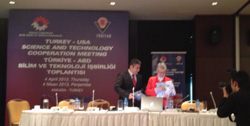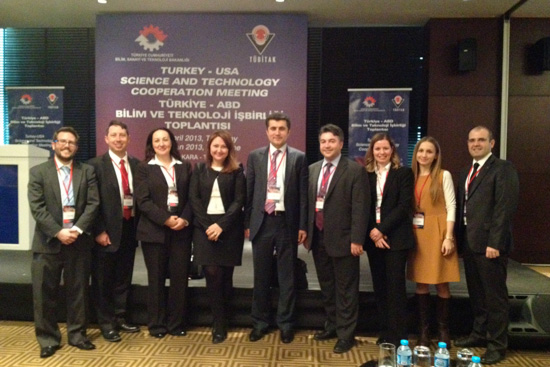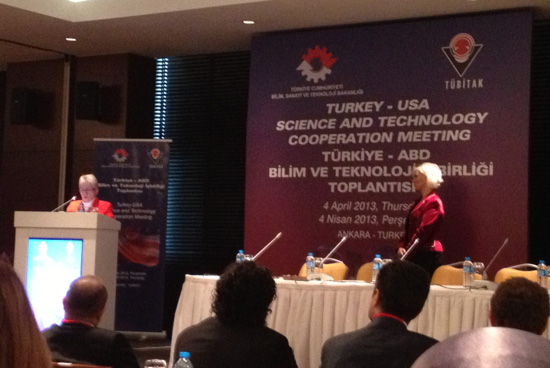TASSA participates USA-TR Joint Science and Technology Committee Meeting
 On April 3-4th, the United States and Turkey held their first high-level science and technology cooperation meeting in Ankara, Turkey. As a result of outstanding efforts led by delegates from both countries, the meeting was very successful in defining the ways to build up bridges to advance science, technology and education objectives under the 2010 U.S.-Turkey Science and Technology Agreement.
On April 3-4th, the United States and Turkey held their first high-level science and technology cooperation meeting in Ankara, Turkey. As a result of outstanding efforts led by delegates from both countries, the meeting was very successful in defining the ways to build up bridges to advance science, technology and education objectives under the 2010 U.S.-Turkey Science and Technology Agreement.
The meeting was hosted by the Scientific and Technological Research Council of Turkey (TÜBİTAK) and the Minister of Science, Technology, and Innovation. Assistant Secretary Dr. Kerri-Ann Jones led the U.S. team composed of 25 representatives from eight federal agencies, three universities, three private companies, and three NGOs. There were over 75 members on the Turkish delegation, which was led by Professor Dr. Yücel Altunbaşak, President of TUBITAK. Both Ambassador Francis Ricciardone and Minister Nihat Ergün spoke at the plenary meeting and provided the vision for this high-level S&T meeting.
As we summarized in our November-Bridge issue, joint science and technology committee meeting initiatives have been co-chaired by the representatives from Office of Science and Technology Cooperation, U.S. Department of State and TÜBİTAK. Chairs were assigned for the different working groups with respect to each country’s area of interests to build up the S&T bridges. The working groups were formed in the following areas: “Biomedical Research”, “Engineering for a Sustainable Future”, “Energy Research”, “Material Science”, “Natural Hazards”, “Innovative Technologies in Agricultural Research” and “Education and Educational Technologies”. The co-chairs of U.S. working groups were mainly representatives from federal agencies, whereas Turkish co-chairs were mostly represented by professors from diverse universities as well as senior scientists from TUBITAK research centers. Turkish delegates shared the S&T interests based on their intense work performed covering diverse institutes in Turkey over the last couple of months. The U.S. co-chairs shared the mission of their agencies as well as summarized the support mechanisms that can be extended to enhance the bilateral science, technology and innovation cooperation.
During the first day of the joint commission meeting (JCM), the working groups’ sessions were concurrently run to discuss interactively the specific roadmaps and propose the actions plans for both countries. Each of the working group discussions were closely followed by Assoc. Prof. Ali Riza Ozdemir, Director of TUBITAK International Cooperation Department and Dr. Brian Carter, Foreign Affairs Officer, Office of Science and Technology Cooperation, U.S. Department of State. Groups first outlined the existing cooperation between Turkey and USA, and then focused on the areas of joint interest for future collaborations. Next the mechanisms for cooperation covering research and funding schemes were discussed. In addition to “one to one” correspondence in the potential funding schemes to support bilateral grants, utilizing each other`s strength and expertise to build up experience in certain areas were also proposed. These include joining to existing networks or sharing some of the resources that may bring the strength to the partners. The mechanisms to contribute the critical mass and knowledge in certain scientific, technology and education areas were among the topics discussed. These action items were prepared as summary slides and presented by group leaders during the plenary meeting on April 4th. Dr. Brian Carter and Prof. Ali Riza Ozdemir were fully devoted to make sure the actions plans proposed by the working groups could be achievable both in the short and long terms.
One of the detailed reports was prepared by Biomedical research working group. The key areas for mutually beneficial biomedical research cooperation between Turkey and USA were identified as “Cancer”, “Infectious Diseases”, “Obesity and Related Disorders”, “Rare Diseases” and “Regenerative Medicine”. The working group report included launching new type of grants, i.e., “Transformative Grants”, “Biomedical Research Network Grants” and “Small Scale Focused Project Grants”. The Engineering for a Sustainable Future Working Group focused as initial priority on ways to make buildings more energy efficient through their design and the materials they are made from. Renewal energy resources were among the highest priority topics for both countries. The Material Sciences Working Group summarized their ongoing activities since the November S&T meeting took place in Ankara. These activities include the Turkish scientists visiting the US to explore collaborations on space propulsion and developing materials for extreme environment. The group working in innovative technologies in agricultural research focused on exploring new areas of cooperative research to improve crop yields and land use through new technologies.
TASSA attended to inaugural high-level S&T meeting by two representatives, Prof. Candan Tamerler (University of Washington) and Dr. Nilay Papila (Ozyegin University) to place Turkish diaspora in building the sustainable S&T bridges between USA and Turkey. We believe that individual TASSA members as well as our institutional members will take critical roles in various activities that will advance science, technology and education between our countries and create many success stories.…

